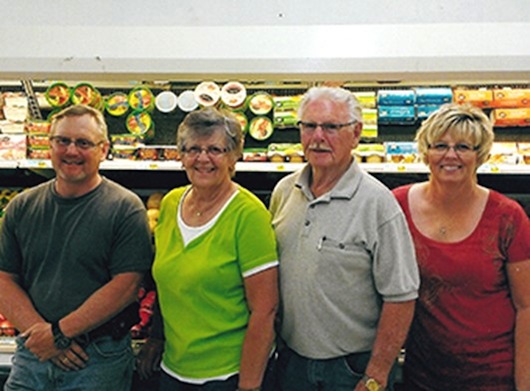by Terrie Ellerbee/associate editor
“Somebody told my wife the other day that we had flunked retirement, because I’m 82 and my wife is right behind me,” said Leroy “Perk” Odell, owner of Super’s stores in Akron, Wiggins, Haxtun and Walden, Colorado.
Perk and Betty Odell are back in the business so that communities in Colorado will have grocery stores again. That wasn’t the plan they’d made, but they are doing it anyway.
It was 1957 when Perk Odell opened his first store in Akron after serving in the U.S. Air Force. The company grew and expanded. In 2006, Odell was operating 11 stores in Colorado and Kansas that employed 200 people. After so many decades in the grocery business, he and his wife made the decision to retire. They sold four stores and some real estate to Sam Mancini. Odell financed approximately $2.5 million of the transaction.
Mancini formed VM Odells dba Bella’s Market. In the first year of ownership under Mancini, VM Odells defaulted on its loans. Two loan modifications followed. In fall 2012, VM Odells was in U.S. Bankruptcy Court in Denver.
By mid-2014, after the much-publicized bankruptcy, the stores had fallen into serious disrepair. Residents in the small Colorado towns knew only that the Bella’s Market stores had empty meat cases, bare shelves and employees with little to do. They began looking elsewhere for groceries, with residents in one community driving at least 60 miles to shop for food.
In August 2014, Perk Odell and family members purchased back four stores, including Odell’s Super’s in Akron, Wiggins Super’s in Wiggins, Haxtun Super’s in Haxtun and North Park Super’s in Walden. All but the Haxtun store had been closed for months when Odell reopened them.
“It’s been kind of a rough road,” Odell said, chuckling. “We started from ground zero.”
One might expect someone who thought he was retiring but had to come back into the business following such a financial mess would be bitter. Not Perk Odell.
“I’m blessed. I’m able to work,” Odell told The Shelby Report. “The Good Lord’s got his hand on my shoulder most of the time, so we’re getting along all right, and I enjoy it. I get awful tired. But it’s OK.”
The biggest obstacle the Odell family has had to overcome is repair work.
“We’ve just been hammered,” he said. “In my Akron store, everything you can think of was broken down. In the four stores, we put in like 14 new compressors and spent a fortune on Freon.”
The positive note on that point is that the Odells got a grant from the Colorado Fresh Food Financing Fund to help pay for new equipment. The fund is designed to improve access to healthy food in underserved Colorado communities by financing grocery stores and other forms of healthy food retail.
“It enabled us to do some upgrading and we’re on that project now,” he said. “We’ve put 24 feet of meat and 12 feet of frozen meat into Akron, and went to all doors, so that will be more energy efficient. We used to have five-deck open cases.”
On the day The Shelby Report reached Odell, he was working in Wiggins putting in some late-model produce equipment.
His son, Tab, is a certified refrigeration repairman and is doing most of the installation of the new equipment. One of Tab’s friends helped replace furnaces that were burnt out in the Akron store.
“We got a lucky break in Akron,” Odell said. “We had two big furnaces. They wanted $18,000 to repair the old furnaces.”
The friend had two new furnaces that Odell bought for $5,000 each.
“Then my compressor rack—I put in the rack system in ’82, and I think it was used then,” Odell said. “Everybody’s fiddled with it, and they wanted $12,000 to rewire it. I lucked out and found two late-model rack systems that haven’t been run much.”
As soon as the weather cools, they will be installed.
“Akron’s been a nightmare. But we’re doing pretty good,” he said. “We’re making headway. We’re gaining.”
A couple of the parking lots are in bad shape, and Odell said they haven’t quite figured out how to pursue those repairs.
“We’ll probably patch to get through the winter and then they’ll be on the agenda down the road,” he said.
The Walden store’s roof was leaking. It had a 15-year warranty, but there had been a hail event in 2011 or 2012, and it didn’t cover hail damage. It was unclear whether Mancini had contacted the insurance company or not. He already was in several legal battles and had a history of financial trouble.
“I hate to go back to court again,” Odell said. “It’s always a battle, and attorney’s fees—I’ve had enough of it. We’ll probably just figure out how to get it done and keep working on it.”
Odell also credits Affiliated Foods Midwest for helping get the stores back up and running.
“They backed me 100 percent,” Odell said. “They gave me a fill of groceries and I’m paying so much weekly, so we’re getting along pretty good. I had accumulated a little real estate, and I’m trying to get some property sold so I can help get rid of my debt.”
Right now, Odell’s company is operating eight stores and his children also are working toward getting the business on track again.

Daughter Tammy Webster managed two of the stores prior to the sales to Mancini. She is establishing a bookkeeping system for the stores and helps with management. Tab Odell also works as a manager and oversees pricing, advertising and merchandising as well as maintaining most of the equipment.
Getting customers to come back has been a challenge for the reopened stores. The stores are doing about two-thirds of what they did before Mancini bought them. But Odell understands why the shoppers haven’t all come back yet.
“We lost that base we had. We were gone eight years,” he said. “You can’t expect it just to rush in your door. You’ve got to earn a lot of it. What I notice in my hometown community is the elderly—and I’m elderly—the elderly people are real receptive. They’d traded with us in prior years, but there are so many new people who’ve moved in, the population is more mobile now, so we’ve got to earn their business.”
The reason the Odells decided to sell in the first place back in 2006 was because they saw the Walmarts and dollar stores coming.
“In fact, the two towns that have a dollar store in them have been the tougher nuts to crack, because when they didn’t have a grocery store, people had to trade at the dollar store, so they probably have some loyalty to them,” Odell said. “That’s probably what is slowing us down a little bit in these two communities in getting the volume back.”
The Odells also were concerned about government regulations, specifically Obamacare.
“We are providing insurance for our employees,” he said. “You kind of hold your breath on that. We just felt to attract good people, we needed to offer insurance.”
The Odells are good people, and while all of their customers may not have returned yet, reopening the stores in the small communities has been much appreciated. In Akron, when old cases had to be taken out, the local electric association came out with a truck to haul them away.
“The guy walks up to me and he says, ‘We’re not going to charge you. We appreciate you being here,’” Odell said. “Pretty cool, huh? Our community has been really supportive.”
That’s just one example of many.
Odell said the stores had their best week since the comeback in August.
“I hope we’re on a roll,” he said.

“The Odells exemplify the type of spirit, hard work and care for the community for which rural, independent grocers have become known over the years,” said Mary Lou Chapman, president of the Rocky Mountain Food Industry Association (RMFIA). “Truly the best, with a big heart and impeccable ethics. He’s now 82 and working this hard because he cares about the community.”
State’s legislature didn’t hurt or help business much
In January, Colorado implemented a raise in the state’s minimum wage to $8.23 and indexed to inflation going forward. There was some debate this year in the Colorado legislature about raising it to $12.50 per hour.
“The grand majority of our members start inexperienced team members at a base wage but it is usually higher than the state mandated minimum wage,” Chris Howes, president of the Colorado Retail Council (CRC) , told The Shelby Report. “The problem arises when the wage floor continues to get bumped up every year. Then everyone else on the team with work experience must get a bump, too. Most economists agree that employers can’t just keep swallowing increased labor costs without repercussions and so you see less and less young people being hired or, unfortunately, traditional layoffs.”
Both the RMFIA and the CRC will fight lifting a 16-year-old ban on letting cities and counties raise the minimum wage on their own. The ban has been in place several years.

“We have fought that successfully on a regular basis at the state capitol and will continue to do so in the future,” Howes said.
The Denver Business Journal reports that the state legislature didn’t do much for business during the 2015 session. Businesses were looking for anti-discrimination lawsuit rollbacks and a business personal property tax cut, among other things. They did pass, mostly because Democrats control the House. In addition to raising the minimum wage to more than $12 an hour, Democrats wanted to increase parental leave and require companies with assets in countries considered offshore tax havens to pay more taxes, but those bills failed in Republican-majority Senate.
“The past two years, the Democrats have controlled both chambers and the governor’s office, so they had a huge advantage in getting their bills passed,” said Chapman. “This year, the leadership is split. Changes in legislators and leadership because of election results brought different attitudes, experience and goals to both houses of the legislature.”
The House introduced legislation this year that would have banned credit card companies and banks from assessing credit card fees on the state and/or local sales tax portion of a transaction.
“I worked hard on this bill,” Chapman said. “But the credit card companies and big banks brought a lot of muscle to legislators and other organizations, including the state chamber.”
The Metro Denver Chamber, along with banks, credit card companies and credit unions, opposed the bill, which was supported by Natural Grocers, 7-Eleven and other retailers.
“The issue of credit card processing fees is incredibly important for retailers because there isn’t a truly free market in which to go shopping for lower rates,” Howes said. “The bill from last session was maybe not ready for prime time, but you will see us keep working on the issue until we get the same rates found throughout the rest of the industrialized world.”
Denver and Colorado are business media darlings
Business media recently have lauded Colorado for its growth and potential. CNBC ranked Colorado fourth on “America’s Top States for Business 2015” list. CNBC scored all 50 states on more than 60 measures of competitiveness and then listed 10 broad categories. Colorado’s economy ranks third among the 50 states, fifth in technology and innovation, eighth for access to capital and ninth for quality of life. Its lowest ranking was 36, for cost of doing business.
Denver, Fort Collins, Boulder, Greeley and Colorado Springs all ranked in the top 40 on Forbes magazine’s “Best Places for Business and Careers.” Denver took the top spot overall for the first time. It finished fourth last year. Forbes said the “Denver-Aurora-Lakewood metro area, home to 2.8 million people, is attractive for its diverse economy, highly educated labor force and outdoor recreational opportunities. Companies are increasing choosing Denver as the site for new operations or to relocate.” Among those companies are Panasonic and Lockheed Martin.
Denver also came out on top of Coldwell Banker Commercial Affiliates’ best markets in the country for commercial real estate, the Denver Business Journal reports. Its first place ranking was due to job growth, construction and economic expansion, particularly in energy, technology and health care.
Even with a growing economy, retailers are not convinced the outlook is rosy.
“From what I am hearing, retailers remain optimistic, but cautious about the economy,” Howes said. “Increasingly intrusive government regulation, a flat GDP and more part-time workers all lead to less money in the customer’s wallet and more challenges for retailers in a viciously competitive market.”
So that’s why it took so long for Trader Joe’s to open in Colorado
Colorado offers some unique challenges for retailers who sell alcohol. For one, grocery and convenience stores are only allowed to sell beer with an alcohol content of up to 3.2 percent. Full-strength beer is available only in liquor stores, and they have a powerful organization, Keep Colorado Local, that is actively fighting any change to that law. Their view is that allowing sales of higher-strength beer in so many stores would not only put them out of business, but also hurt craft brewers because grocery chains would more likely choose to stock national brand beers once the gates open.
That is not true, according to Colorado Consumers for Choice. Howes, who also is part of that organization, told The Shelby Report that Colorado craft beer lines the shelves of many grocery stores across the country, just not in their home state.
“We’ve attended a handful of summer festivals over the last few months and heard from those Coloradoans who have visited other states over their summer vacation. Guess what? They were excited to see Colorado craft beers on shelves across America,” Howes said. “So it makes sense to us that if Colorado craft beer is being sold in grocery stores across America, our customers should be able to purchase it conveniently at Colorado grocery stores.”
Instead of just battling again with state legislature, Colorado Consumers for Choice is working on a ballot initiative to let voters express their views on the matter.
“From our initial outreach so far, we’ve seen very positive reactions,” Howes said.
Another issue in Colorado is that, despite longtime and ongoing efforts to change the law, it allows grocery retailers to hold just one liquor license. In other words, a chain like Kroger operates several King Soopers in the state, but only one location has a liquor license.
It’s the reason why Trader Joe’s just opened its first Colorado store in 2014. Consumers who like “Two Buck Chuck” have to go to the Denver store on North Colorado Boulevard. The other Denver store, as well as those in Boulder, Colorado Springs, Fort Collins and Greenwood Village, can’t sell it.
Howes said the state has been “catching up by repealing some of the Prohibition-era laws. This is likely one that will be addressed in the near future.”
Even as the state’s liquor laws are slow to change, technology has made it easier for Colorado residents to get their hands on booze.
“We’ve seen a number of delivery services from liquor to grocery store to restaurant delivery services enter the Denver market,” Howes said. “I think part of the appeal is that people can go online or use a smartphone app to quickly and efficiently enter their selections on their own time. Consumers are demanding greater convenience and grocery stores, in particular, are meeting this demand by offering online shopping and delivery services.”
There has been a bit of progress for retailers who are allowed to sell beer, wine and spirits. A law took effect his year that allows businesses with liquor licenses that have expired for less than six months to get their licenses back without having to start the process over.
*Editor’s note: This 2015 Colorado Market Profile also appears in the September print edition of The Shelby Report of the Southwest.






